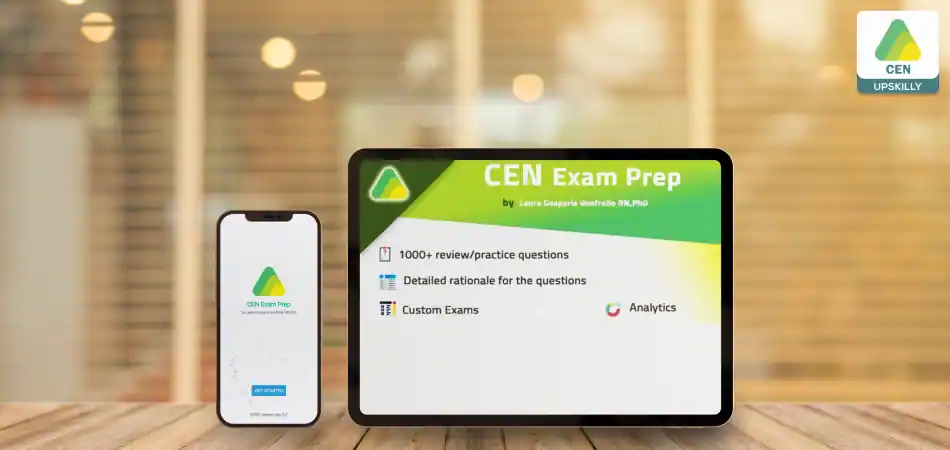CERTIFIED EMERGENCY NURSE
- Home
- All Courses
- NURSING
- CERTIFIED EMERGENCY NURSE
Overview
Elevate your nursing career by becoming a Certified Emergency Nurse (CEN)!
With this certification, you’ll have the expertise and skills to provide advanced care to patients in emergency situations.
The CEN (Certified Emergency Nurse) exam is a certification exam designed to evaluate the knowledge and skills of registered nurses who work in emergency departments or other critical care settings. To become a CEN, a registered nurse must meet certain eligibility requirements, including having a valid nursing license and a minimum of two years of experience working in an emergency department or other critical care setting along with passing the CEN.
Why CEN?
CEN certification is a valuable credential for nurses who work in emergency nursing. There are several reasons why a registered nurse may choose to pursue CEN (Certified Emergency Nurse) certification:
Professional Development:
Earning the CEN certification demonstrates a commitment to advancing one’s knowledge and skills in emergency nursing. It shows a dedication to professional development and a desire to provide high-quality care to patients in emergency situations.
Career Advancement:
Many employers in the healthcare industry value nurses who hold specialty certifications such as CEN. Nurses who hold the CEN certification may be more competitive in the job market and have greater opportunities for career advancement.
Increased Confidence:
Nurses who hold the CEN certification have demonstrated a high level of knowledge and competence in emergency nursing. This can lead to increased confidence and job satisfaction, which can have a positive impact on patient care.
Credibility:
The CEN certification is recognized as a standard of excellence in emergency nursing. It provides credibility to nurses who hold the certification and assures patients, employers, and colleagues that the nurse has met rigorous standards of knowledge and competency.
CEN Test Plan
Test Format
The CEN (Certified Emergency Nurse) exam is a computer-based test consisting of 175 multiple-choice questions. The exam is timed and lasts three hours. There is no penalty for guessing, so it is recommended to answer all questions.
The questions on the exam are designed to evaluate the candidate’s knowledge and skills in emergency nursing.
The questions are presented in a single-response, multiple-choice format, with one correct answer and three incorrect options. The exam includes some unscored questions that are used for statistical purposes and do not count toward the final score.
The passing score for the CEN exam is a scaled score of 109 or higher. Scaled scores range from 0-150, with 100 being the minimum passing score. The exam results are provided immediately following the completion of the exam.
Topics
The CEN (Certified Emergency Nurse) exam covers a broad range of topics related to emergency nursing. The following is a general overview of the exam content:
-
Cardiovascular Emergencies:
This includes topics such as cardiac monitoring, arrhythmias, chest pain, acute coronary syndrome, and heart failure.
-
Respiratory Emergencies:
This includes topics such as airway management, respiratory distress, pulmonary embolism, and respiratory failure.
-
Neurological Emergencies:
This includes topics such as stroke, seizures, traumatic brain injury, and altered mental status.
-
Gastrointestinal Emergencies:
This includes topics such as gastrointestinal bleeding, pancreatitis, liver failure, and bowel obstruction.
-
Genitourinary Emergencies:
This includes topics such as urinary tract infections, kidney stones, and renal failure.
-
Gynecological and Obstetrical Emergencies:
This includes topics such as ectopic pregnancy, obstetrical emergencies, and sexual assault.
-
Psychosocial Emergencies:
This includes topics such as domestic violence, substance abuse, and psychiatric emergencies.
-
Maxillofacial and Ocular Emergencies:
This includes topics such as eye injuries, facial fractures, and dental emergencies.
-
Orthopedic Emergencies:
This includes topics such as fractures, dislocations, and compartment syndrome.
-
Environmental and Toxicologic Emergencies:
This includes topics such as hypothermia, heat stroke, poisoning, and exposure to hazardous materials.
-
Shock and Multisystem Trauma Emergencies:
This includes topics such as shock, multiple traumas, and burns.
CEN Registration Process
Step 1- Determine eligibility:
Before registering for the CEN exam, you must determine if you are eligible. The BCEN website provides detailed information about eligibility requirements, including education and experience requirements.
Step 2- Create an account:
If you are eligible to take the CEN exam, you will need to create an account on the BCEN website. This will allow you to register for the exam and access other resources related to certification.
Step 3- Register for the exam:
Once you have created an account, you can register for the CEN exam. The registration process typically involves providing basic personal and professional information, selecting a testing date and location, and paying the exam fee.
Step 4- Prepare for the exam:
After registering for the CEN exam, you will need to prepare for it. This may involve studying the exam content outline, reviewing textbooks and study materials, and taking practice exams.
Step 5- Take the exam:
On the day of the exam, you will need to arrive at the testing center on time, with appropriate identification and any necessary materials. The CEN exam is computer-based and consists of 175 multiple-choice questions.
Step 6- Receive results:
After taking the CEN exam, you will receive your results immediately. If you pass the exam, you will be certified as a CEN. If you do not pass, you may be eligible to retake the exam after a certain period of time.
Fees
The fees for the Certified Emergency Nurse (CEN) exam may vary depending on the country and the organization administering the exam. In the United States, the CEN exam fee is currently $370 for members of the Emergency Nurses Association (ENA) and $470 for non-members. However, these fees are subject to change, and it is recommended to check with the ENA or the exam administrator in your country for the most up-to-date fees.
It is important to note that the CEN exam fee is non-refundable, and payment is required at the time of registration. Some organizations may offer discounts or reimbursement for exam fees for their employees or members, so it is worth exploring these options if they are available to you.
Scoring Strategies
-
Understand the Scoring System:
The CEN exam consists of 175 multiple-choice questions, with four possible answer options. The exam is scored on a scale of 0-200, with a passing score of 109. To pass the exam, you need to answer at least 97 questions correctly.
-
Review Test:
Taking Strategies: Before taking the CEN exam, review test-taking strategies such as time management, the process of elimination, and answering the questions you know first. These strategies can help you manage your time effectively and improve your chances of answering questions correctly.
-
Focus on Your Weak Areas:
If you have identified areas where you are weak in emergency nursing, focus your study efforts on these areas. Use study resources such as textbooks, online courses, and practice exams to improve your knowledge and skills in these areas.
-
Take Practice Exams:
Taking practice exams can help you get familiar with the types of questions that will be on the CEN exam. Many study resources offer practice exams that simulate the actual exam format and scoring system. Use these practice exams to identify areas where you need to improve and to build your confidence.
-
Utilize Exam-Day Strategies:
On exam day, read each question carefully and pay attention to keywords that can help you identify the correct answer. Use the process of elimination to eliminate incorrect answer options and increase your chances of selecting the correct answer. Also, make sure to manage your time effectively so that you can answer all questions within the allotted time.
Don’t let the CEN exam intimidate you. Our CEN Exam Preparation App offers a comprehensive study plan that includes practice exams, flashcards, and in-depth explanations of emergency nursing concepts. With our app, you can prepare for the CEN exam on the go and at your own pace. It has a user-friendly interface and customizable study plans that make it easy to fit studying into your busy schedule. Plus, our app’s algorithm adapts to your performance, ensuring you focus on the areas where you need the most improvement.
Tackle the exam and take your emergency nursing career to the next level. Download our app today and start your journey to becoming a Certified Emergency Nurse!
FAQ's
CEN stands for Certified Emergency Nurse. Emergency nurses work in emergency departments, caring for patients who may need urgent, life-saving care. They may work in a subcategory of emergency care such as stroke, cardiac, or burn units, or they may work in a general emergency department.
There are several study apps available for the CEN exam. Here are some of the best ones: CEN Exam Prep 2023, MedEd Seminars and Gentoo Labs CEN exam prep app.
Critical care units are specialized hospital wards that provide treatment and monitoring for people who are very ill. Working in a critical care unit can be a very rewarding experience for healthcare professionals.
Education (ADN or BSN), Licensure (NCLEX-RN), Certification (CEN), Experience, Advanced Life Support Training.




